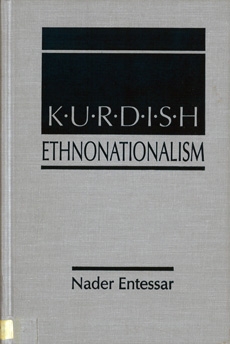|
PREFACE
The purpose of this book is to analyze the political and social dimensions of Kurdish integration into the mainstream of sociopolitical life in Iran, Iraq, and Turkey. The central thesis of the book is that ethnic conflict constitutes a major challenge to the contemporary nation-state system in the Middle East. In other words, the book challenges the long-held view that assimilation is an inevitable result of modernization and the emergence of the relatively strong and centralized nation-state system in the Middle East. Perhaps no single phenomenon illustrates this thesis more vividly than the historical Kurdish demands for self-determination.
In addition to Western literature, I have relied on Middle Eastern sources and publications of various Kurdish organizations, such as the Kurdish Democratic Party and Komala. Notwithstanding the importance of the Kurds for nation building and regime maintenance in Iran, Iraq, and Turkey, there are few comprehensive scholarly books on this subject. Many of the recent books on the Kurds are cither anecdotal or written to support the ideological position of a particular group or political movement. Of the few other books that have been written by scholars, most arc either out of date or have a narrower focus than this one. I hope that it will provide a balanced treatment of the Kurdish dilemma in the late twentieth century that will be useful to both scholars and informed readers.
In transliterating Arabic and Persian names and other words into English, I have relied on the most commonly used spellings. For simplicity, I have avoided using diacritical marks. Since modern Turkish, unlike Arabic and Persian, uses the Latin alphabet, I have tried to maintain the spellings of Turkish names as they are used in Turkish publications. For this reason, some names may be spelled differently in Turkish than they are spelled in Arabic or Persian.
A number of sources have aided in the research for this book. Spring Hill College awarded me several faculty research grants for data collection. The National Endowment for the Humanities provided me with two summer grants for college teachers to participate in seminars on ethnic minorities and cultural pluralism at Harvard University and the University of Wisconsin-Madison.
The staff of the interlibrary loan service at the Thomas Byme Memorial Library at Spring Hill College was especially helpful in obtaining various books and documents for me in a timely and efficient manner. Anonymous reviewers provided useful insight and critical comments on earlier drafts of this manuscript I also want to thank Martha Peacock for her cooperation and support of this project, and Gia Hamilton and Steve Amey for their astute editorial work. Last but not least, my wife, Marie, provided expert word-processing skills and help in revising the various drafts of this manuscript. I am indebted to all of them. Any errors of fact and interpretation are, of course, my sole responsibility.
Nader Entessar
1
Kurdish Ethnicity: Introduction and Overview
The end of the Cold War has augured a new vision of the global order and conflict management. In a controversial article, policy analyst Francis Fukuyama even suggests that with the apparent triumph of Western liberalism over Soviet communism, all underlying causes of conflict in the world have been eliminated.
What wc may be witnessing is not just the end of the Cold War or the passing of a particular period of history, but the end of history as such: that is, the end point of mankind’s ideological evolution and the universalization of Western liberal democracy as the final form of human government.1
Although Fukuyama in his neo-Hegelian theory acknowledges the importance of religious fundamentalism and ethnonationalism in global politics, he nevertheless asserts that Western liberalism will eventually prevail over possible challenges presented by these and similar phenomena.2
Though it is beyond the scope of this book to examine the validity of Fukuyama’s theory, one could reasonably assert that the phenomenon of ethnonationalism will continue to pose a major challenge to the nation-state system and will continue to be a serious source of conflict in multiethnic societies irrespective of the predicted triumph of Western liberalism on a global scale.
The revival of ethnonationalism in the Middle East, the former Soviet Union, Europe, and the Americas in the late twentieth century is a clear manifestation of the existence of sources of conflict that cannot be dealt with satisfactorily through the application of the macro theories of world order.
The rise of ethnic consciousness and the political demands of many minority or ethnic groups for self-determination has run against the perceived interests of the state as the dominant actor in global politics. As the history of Kurdish ethnonationalism clearly demonstrates, politicization of Kurdish ethnicity coincided with the formation of the modem nationstate system in the Middle East.3 In other words, competing claims of ethnic groups and the state have transformed ethnicity from a purely ... | 